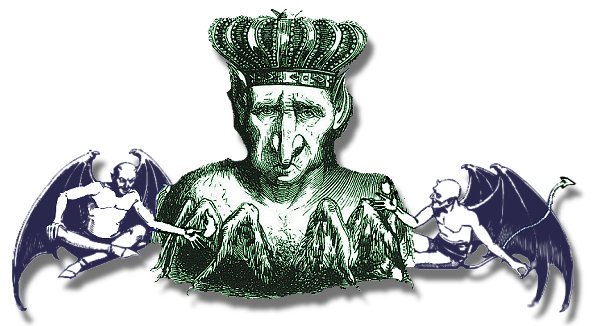|
Gary said many times over again that the best government
was that of the philosopher-king.

At great length he would go on about the traits a philosopher-king should possess -- such as being able to distinguish between coincidence and conspiracy. Another trait he mentioned was not punishing messengers for bringing bad news.
Surrounding a man with liars until he became so disgusted with lying that he would not tolerate an untruth was one of his ideas for preparing the philosopher-king for the job. On a seperate occasion he told me that someday I would be surrounded by liars, and if I could find a way to make them tell me the truth I would become philosopher-king.
"Kerry, there are tribal secret societies that surround their king with beautiful women all his life and watch him make love to them -- then they sacrifice him."
That sounded like a dubious honor.
"Kerry, do you think a philosopher-king should have a good enough memory to remember something for thirteen years?"
Of course.
"Rosenberg should not be accused of wanting dictatorship as a principle," Viereck tells us in Metapolitics, adding soon afterwards: "He follows the spirit of Wagner's complicated distinction between King and monarch. Rejecting alike government by parliament or by kaiser (monarch), Rosenberg demands the Volk-king, the hero-dictator risen from the ranks, whom Jahn and Wagner prophesied.
"The qualities and justification of the Volk-king are outlined in the Fuhrer section of the chapter on Wagner's metaphysics. This Wagnerian concept is basic to nazism. Rosenberg says: 'We want to see in a German king a person like ourselves... but yet the incarnation of a hero myth.'...
"The gist of the Fuhrer myth is that the Fuhrer is (incarnates) the Volk, instead of ruling it detachedly like monarch or economic class or representing it like a democrat. The Fuhrer is an organic part of the Volk instead of a detached atom. This myth is absolutely basic to Hitler's rule today. Of course, it is only a myth...."
"Kerry, I think the philosopher-king should be a very gentle person, someone with the soul of a poet, but that he ought to be surrounded for protection by mad dogs -- the worst and meanest badasses around."
Though wondering what type of administration that would produce, I kept my specualtions to myself.
"Kerry, you know at the end of the war Hitler came up on the radio and gave a speech calling for the werewolves of Germany to come to the aid of the Nazi cause."
"Yes, you have mentioned that before," was my response after the first telling.
"Do you believe the saying that power corrupts and that absolute power corrupts absolutely?"
"Yes. It's like Ayn Rand says, 'Who will protect us from our protectors?' That's an old Roman saying, but it's in Latin."
"You've also heard the saying, 'Curiosity killed the cat."
"Yeah, that's a bunch of shit, though. More cats have been killed from lacking the curiosity to look both ways before crossing the street, probably, than by too much curiosity."
"You might just want to keep it in mind anyway. Someday you may find yourself in a situation where it is true."
"I doubt that very much."
"Well -- just don't forget you could be wrong."
I was not inclined to persist in arguments with a man who might be both armed and dangerous, not to mention insane.
"Kerry," he once said, "one good way to construct the government of the philosopher-king would be to arrange it so that whoever was king didn't know it, and in such a way that he would be used for decision-making purposes while standing in line at the store and places like that."
So incomprehensible a notion seemed academic to me, but I saw no reason to say as much. A stupid idea anyhow, this philosopher-king jazz, because even if a dictator managed to rule benevolently, what was to guarantee an equally kind and wise successor? That objection expressed, Slim and Gary both answered, "Yes," and looked smug, as if they had already thought about that one and solved it.
As for our unwitting philosopher-king, Slim contributed something now about that idea: "As one good way to do it. Not the only way."
"Sure," I said, eyeing them both with a mixture of skepticism and boredom, "that sounds like one good way to have a philosopher-king."
"What do you think about the omnibudsmen they have in Scandinavian countries to help ordinary people gain access to government? What about having people like that in our nation? Do you think that would be a good idea?"
I did.
Once Brother-in-law also asked me if I didn't agree that the philosopher-king should also be someone who could keep "state secrets."
I routinely concurred.
|
![]()
![]()